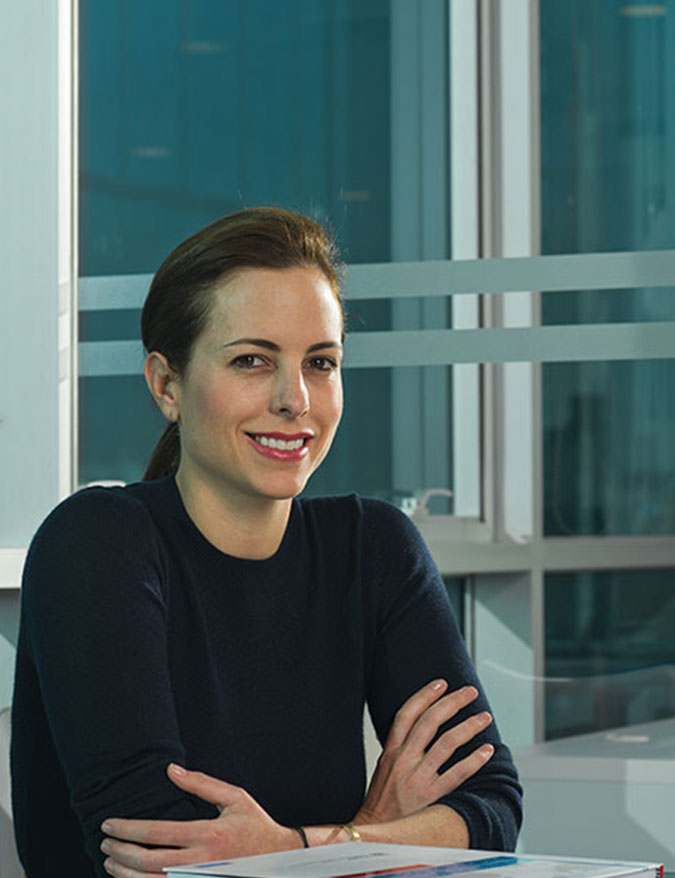
I think it’s something like less than one third of family businesses that make it from the first to the second generation and half of those don’t make it to the third generation
; says Adriana Cisneros. I'm the third generation in our business, so I really hope I'm going to be one of those that survives. Who knows, I might completely mess up, but hopefully not.
Messing up seems a rather unlikely prospect going by Adriana's record to date. The company is in robust health under her leadership. She has recently returned from a whistle-stop tour of Central and South America, where Cisneros Interactive has become the sole reseller of Facebook in nine countries, the only nations on earth where the social media giant will not manage its own sales.
Facebook chose to work through Cisneros Interactive because it already has the region’s most advanced advertising network. I started Cisneros Interactive, our digital division four years ago
says Adriana.
Our aim from the outset has been to create the largest advertising network in Latin America and also the smartest. When we began, others were trying to do similar things, but in a very country-specific way. No one really dared to do it pan-regionally. I used the same architecture to build the business that my father did when he brought satellite television to Latin America three decades ago.
Innovation through the ages
Corporate reinvention through innovation has defined Cisneros from its earliest days. In 1939, Adriana’s grandfather, Diego Cisneros, made the two-week voyage by steamship from Caracas to New York to attend the World’s Fair.
The soda he sampled when he got there wasn’t at all to his tastes, but he nevertheless recognized that it might have mass appeal in his native continent. And so it was that the far-sighted owner of a trucking company acquired the exclusive sales and marketing rights to Pepsi Cola in Venezuela.
Thirsty Venezuelans were among the first to benefit from Cisneros’ innovative flair. Its founder also came by the rights to Ford and Studebaker vehicles in the early days.
My father Gustavo followed in my grandfather’s footsteps,” says Adriana. “He introduced lots of amazing brands into Latin America. Satellite entertainment was probably his boldest move, as it meant we had to launch our own satellite into space. As a teenager, I’ll never forget standing with my father at Cape Canaveral, watching as it entered into orbit.
Corporate renewal
Today, Cisneros is a dynamic global organization. It owns Venezuela’s largest television network, as well as the largest independent TV and film studio serving the Spanish-speaking communities across the Americas. Despite the breadth of its operations, however, the company today is set up very differently to when Adriana took the helm. One of her first acts was to oversee a rootand-branch restructuring of its operations, rationalizing twenty-eight silos into three divisions and creating much more connectivity within them.
We now have media, interactive, and real estate
says Adriana. We've been in media for seventy five years. Our content is seen in over 100 countries in thirteen languages. Cisneros Interactive is our digital business, with our regional advertising network. Real Estate is another new division. It's about identifying and developing high-end projects, like the amazing beach resort hotel and golf course we're working on in the Dominican Republic. Oh, and then there's a new division we're putting together. But that's a secret for now.
Digital rebirth
Adriana first joined the family business in a specially created role, which allowed her to get a unique perspective into its workings. No one knew what ‘director of strategy’ really meant
she recalls.
That was wonderful because it gave me full access. I was able to go into any meeting and ask any question. As well as the need for restructuring, one of the insights I gained was from studying how our content was being consumed digitally by the outside world.
Cisneros’ most famous content is probably its telenovelas – colorful, racy, soap opera-like series – which enjoy a cult-following across the Spanish-speaking world.
I noticed that people were sharing our content on YouTube and it was getting millions of views. We recognized that younger people were increasingly consuming shows on YouTube at a time when many thought the platform was just for videos of cats playing the piano. We also realized that there was a lot of money to be made from digital traffic but that there was no one specializing in that traffic in the Hispanic market.
The success of the company’s new strategy really began to hit home during the screening of Eva Luna, a love story set in Los Angeles. A Spanish-language soap opera was getting higher viewing figures than a hit reality show about dancing
says Adriana. Everyone was trying to figure out where our extra fifteen million viewers had come from. Our digital strategy had gotten people watching on their cellphones and computers, not just on TV. Grandmothers were watching but so was the sixteen-year old granddaughter. We had made our programming reach a much younger audience.
I noticed that people were sharing our content on YouTube and it was getting millions of views.
The next century
Almost a hundred years after Diego Cisneros began his journey of innovation, the company that bears his name believes that it is well positioned for the next century. My father and grandfather always took a long-term view and that’s what we’re still doing today
says Adriana. “Long-term horizons and objectives help stop you panicking every time the economy does something funny. In Latin America, you can easily have a few countries suffering political or economic instability at any given moment. Playing the long game and having pan-regional exposure helps us mitigate those risks. It’s been really fruitful for us.”
Taking a long-term perspective also enables us to develop meaningful relationships. Take decisions with only the short term in mind or fail to care about your neighbor, and your neighborhood will surely shrink. We have treated our region the right way for decades and the business has so many friends. These relationships are as essential to our future as innovation is.
Successful succession, Cisneros style
It was never written in the stars that Adriana would lead the family business. As the youngest of three siblings by ten years, she may indeed have been regarded as an unlikely choice. Neither does Cisneros insist that its leaders are drawn from the Cisneros family. Adriana’s predecessor in the top job – who served a successful fifteen years in charge – was from outside the bloodline. So, how did the art history and journalism graduate end up as CEO of Cisneros?
I was always curious about the business and my parents encouraged me to join them in meetings and on business trips whenever possible. They made it very easy for me to be involved and engaged in the business from an early age
says Adriana. However, there was never a master plan. It was only after I had joined as director of strategy and was proposing business innovations and restructuring that a formal conversation about my taking over as CEO arose. That’s when we realized that there needed to be a path to prepare me, not only the new things I had to learn, but also how to get the company and the rest of the family to accept me as the new leader. When you’re the youngest, that can feel a bit unnatural.
And so, a formal program was put together for Adriana. I basically went back to school. I had this incredible professor called John Davis who specializes in family businesses
she recalls.
He tailor-made a program for me, and I did all the classes between Harvard Business School and Columbia Business School. I also had a finance tutor. Everything I was learning was specific to running family businesses. No case studies of Chinese agricultural companies! It was all media, family, innovation, Latin America, and so on. I had two children in the meantime but somehow I felt like I could do it all.
So, what advice would Adriana give to the many young family members whose families expect them to follow in their footsteps? If you’re feeling pressured into joining the family business, say you don’t want to and make sure your family listens. I often see people who never wanted to join or lead their family business, but who cave in. It never turns out well.

You need genuine passion and maybe even a bit of craziness to take this on.
It’s not fair on you to have to commit your life to something that won’t fulfil you and make you happy. It won’t be good for the business or your family either.” Ten children make up the Cisneros family’s next generation. “They’re currently aged between nine and thirteen, but before we know it, they’re going to be at intern age, college age, recruitment age. We’re being proactive. We’re telling them now there’s no expectation they must join the business. I’d much rather they were passionate about becoming scientists, doctors, or astronauts, rather than feeling they had to join the company. I also don’t want them to feel any entitlement. That’s why we’re putting really clear rules in place as to how they’d have to qualify for internships or jobs after grad school. Above all, this is important for keeping the peace in the family.
Adriana Cisneros: My life
I grew up in Venezuela in the 1980s. The country was still very prosperous in those days, thanks to the oil boom. Caracas is the most beautiful place, with this wonderful valley and amazing mountains. I had the happiest childhood imaginable. On weekends, we would sometimes travel to the Amazon and visit the indigenous communities. That was really special. When I was fourteen, I went to boarding school in the US and then on to college in New York.” Both our family and our business moved from Venezuela to Miami in 1998. Leaving our home country and having to start again elsewhere was a real experience. But we were raised to be highly adaptive children. Our family has always travelled a lot. My father was constantly launching new ventures in faraway places. I recall him opening up production facilities in China in the 1990s, well before most companies did that. We feel comfortable operating in almost any country because our experience helps us to sense what the differences are. My kids are half-English, half-Venezuelan and were born in the US. They are proud Americans, but also more than that. I make sure they visit Latin America with me as much as possible, so that they see both the opportunities and the greatness of the place, and so they see what the world beyond Miami looks like. We’ve had a place in the Dominican Republic for decades, and I guess I feel somehow a bit Dominican too. We go to Europe and the kids love having that sense of history behind them. It’s all part of what makes us citizens of the world. My parents are an extraordinary couple, married for almost fifty years. They’ve got this phenomenal dynamic between them, always being a part of each other’s successes from the start. My father would not have been able to scale our business as quickly as he did without my mother by his side. And she wouldn’t have been able to have had such an impact on culture and the arts without his supportiveness. Together, my mother and father have accumulated what’s probably the world’s largest collection of Latin American art. They’ve given away much of it – including their modernist collection of around a hundred works – to the Museum of Modern Art in New York. They did so completely selflessly, without receiving any sort of tax break. They firmly believe they are only ever custodians – rather than owners – of the art they’ve acquired. They just wanted to find the best home for it.
Comprehensive services for your wealth
We customize our offering to help you protect and grow your wealth.
- All
- Investment
- management
- lifestyle
- legacy




